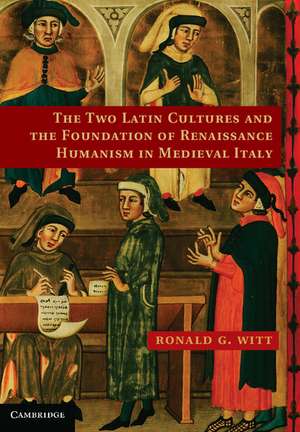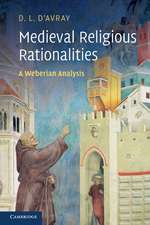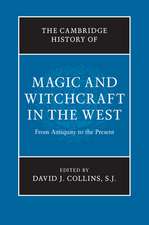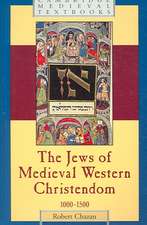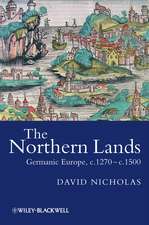The Two Latin Cultures and the Foundation of Renaissance Humanism in Medieval Italy
Autor Ronald G. Witten Limba Engleză Hardback – 18 mar 2012
Preț: 1068.22 lei
Preț vechi: 1242.11 lei
-14% Nou
Puncte Express: 1602
Preț estimativ în valută:
204.42€ • 212.21$ • 170.46£
204.42€ • 212.21$ • 170.46£
Carte tipărită la comandă
Livrare economică 22 martie-05 aprilie
Preluare comenzi: 021 569.72.76
Specificații
ISBN-13: 9780521764742
ISBN-10: 0521764742
Pagini: 618
Dimensiuni: 183 x 254 x 36 mm
Greutate: 1.66 kg
Ediția:New.
Editura: Cambridge University Press
Colecția Cambridge University Press
Locul publicării:New York, United States
ISBN-10: 0521764742
Pagini: 618
Dimensiuni: 183 x 254 x 36 mm
Greutate: 1.66 kg
Ediția:New.
Editura: Cambridge University Press
Colecția Cambridge University Press
Locul publicării:New York, United States
Cuprins
Introduction; Part I. The Two Latin Cultures of Medieval Italy: 1. The Carolingian conquest; 2. Italy and the Ottonian renaissance; 3. The golden age of traditional book culture and the birth of a new book culture (1000–1075); Part II. The Birth of New Order: 4. The investiture conflict and the emergence of the communes; Part III. The Dominance of the Legal-Rhetorical Mentality: 5. The triumph of the legal culture; 6. The institutional structure of education, 1100–1180; 7. Literary creativity in an age of intensifying legal-rhetorical culture; Part IV. The French Renaissance of the Twelfth Century: 8. French literary and scholarly achievement in the twelfth century; Part V. Toward a Broader Intellectual Life: 9. The destabilization of the elites and the expanding market for education; 10. New knowledge and the tempering of the legal-rhetorical culture; 11. The development of the traditional disciplines and the resolution of the crisis of language; 12. The return to antiquity; Conclusion; Appendix.
Recenzii
'Abounds with apposite insights and analyses … packed with erudition.' The Times Literary Supplement
'… showcases an experienced, thoughtful historian at his craft … His writing has an eye for literary excellence … As if looking out at the past from the window of the humanist Coluccio Salutati, the late fourteenth-century Florentine chancellor, Witt has a vision for culture shaped by the processes of competition, patronage, and political strife.' Reviews in History (history.ac.uk/reviews)
'This will be an essential work for historians of medieval culture and not just in Italy, for in addition to sifting the wheat from the abundant chaff of earlier research, Witt's deep familiarity with the original sources permits him to arrive at a comprehensive picture of Italian culture and education from the eight to the thirteenth centuries.' The Catholic Historical Review
'We have long needed a magisterial work to navigate the artificial barrier between 'medieval' and 'Renaissance' histories of intellectual, literary, institutional, and political life … Here it is.' Richard J. Oosterhoff, Fides et Historia
'… written for anyone who ever wondered not only who was teaching what to whom in northern Italy between the ninth and the thirteenth centuries but how and why.' Kathy Eden, Common Knowledge
'This is a book that no one with an interest in the intellectual history of medieval Italy can possibly afford to ignore; it is a book furthermore that is a landmark in the discussion of the origins of the Renaissance, and will surely remain an essential point of reference, not only for the remarkable synthesis that it offers, but for the way in which it puts its material at the reader's disposal in a bibliography and outstanding analytical index that between them account for one fifth of the volume. Such technical generosity allied to the scholarly generosity of spirit that infuses every phase of the argument is rare indeed, and can only be the mark of wisdom as Socrates described it.' Nicholas Mann, Nexus Institute (https://www.nexus-instituut.nl/en/nexus-review)
'… showcases an experienced, thoughtful historian at his craft … His writing has an eye for literary excellence … As if looking out at the past from the window of the humanist Coluccio Salutati, the late fourteenth-century Florentine chancellor, Witt has a vision for culture shaped by the processes of competition, patronage, and political strife.' Reviews in History (history.ac.uk/reviews)
'This will be an essential work for historians of medieval culture and not just in Italy, for in addition to sifting the wheat from the abundant chaff of earlier research, Witt's deep familiarity with the original sources permits him to arrive at a comprehensive picture of Italian culture and education from the eight to the thirteenth centuries.' The Catholic Historical Review
'We have long needed a magisterial work to navigate the artificial barrier between 'medieval' and 'Renaissance' histories of intellectual, literary, institutional, and political life … Here it is.' Richard J. Oosterhoff, Fides et Historia
'… written for anyone who ever wondered not only who was teaching what to whom in northern Italy between the ninth and the thirteenth centuries but how and why.' Kathy Eden, Common Knowledge
'This is a book that no one with an interest in the intellectual history of medieval Italy can possibly afford to ignore; it is a book furthermore that is a landmark in the discussion of the origins of the Renaissance, and will surely remain an essential point of reference, not only for the remarkable synthesis that it offers, but for the way in which it puts its material at the reader's disposal in a bibliography and outstanding analytical index that between them account for one fifth of the volume. Such technical generosity allied to the scholarly generosity of spirit that infuses every phase of the argument is rare indeed, and can only be the mark of wisdom as Socrates described it.' Nicholas Mann, Nexus Institute (https://www.nexus-instituut.nl/en/nexus-review)
Notă biografică
Descriere
This book traces the intellectual life of Italy, where humanism began a century before it influenced the rest of Europe.
